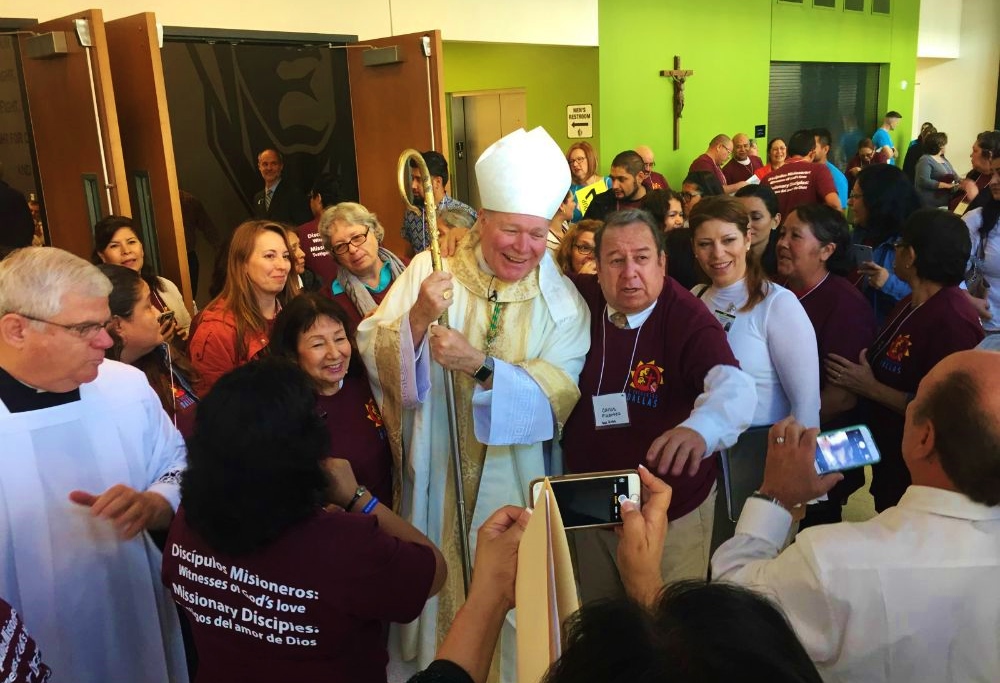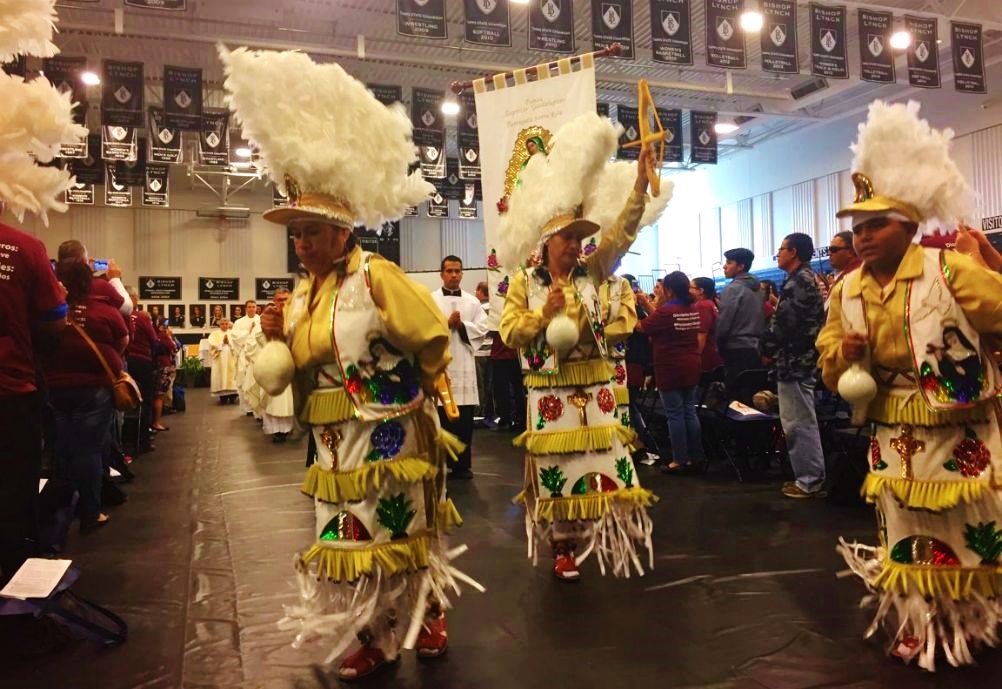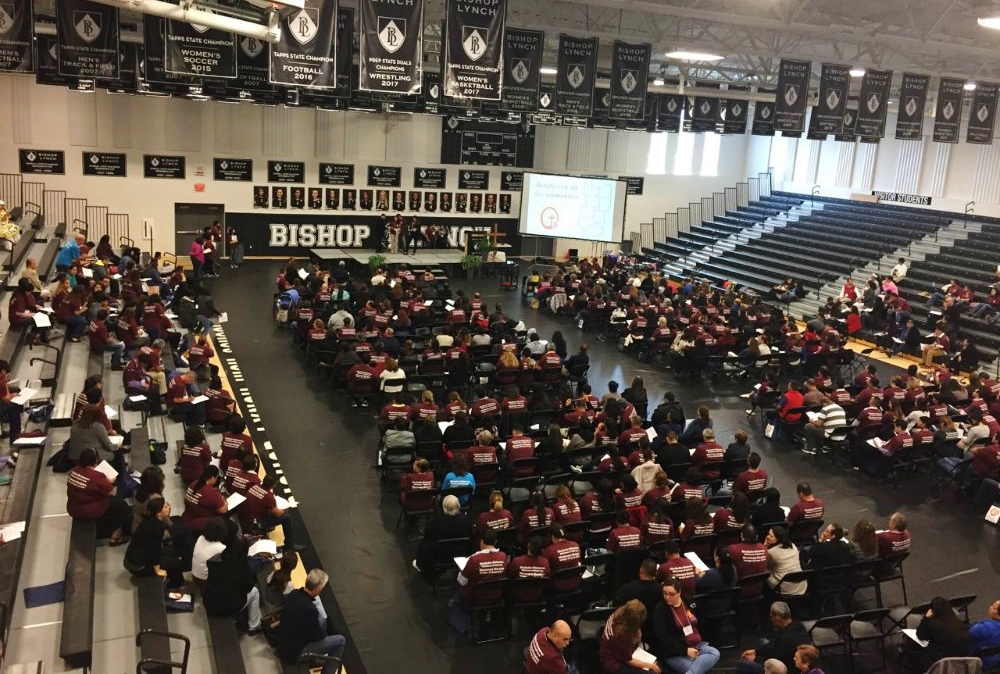
Bishop Edward Burns greets participants of the Dallas diocesan encuentro after Mass on Nov. 11. (NCR/Soli Salgado)
About 500 Hispanic Catholics filled the Bishop Lynch High School gymnasium in Dallas, Texas, convening for the diocesan V Encuentro Nov. 11.
In a city where the 1.3 million practicing Catholics range from multimillionaires to the marginalized, delegates from each parish in the diocese came prepared to share the concerns and recommendations that their fellow parishioners had discussed at parish encuentros throughout the summer and fall.
The day began with a bilingual Mass (different readings and prayers done in English and Spanish). In his homily, Bishop Edward Burns, who came to Dallas from Juneau, Alaska, in February, told the audience, largely dressed in maroon, diocese T-shirts, that he's been learning Spanish at a nearby grade school to be of better service to his diocese that is 50 percent Hispanic.
Dallas' Hispanic community is overwhelmingly Mexican-American, while Central Americans — specifically Salvadorans — come in second. (Following his return from a July trip to El Salvador, Burns hosted a celebration to honor the 100th birth anniversary of Blessed Óscar Romero, which was widely attended and appreciated by the Salvadoran community.)
Burns said one thing he likes about the V Encuentro is how it's "coming right in line with a series of events within the church," such as the July convocation of Catholic leaders in Orlando, Florida, preparations for the 2018 synod on youth, and eventually the apostolic exhortation on the synod.
"All of this is truly the momentum of Pope Francis, which is phenomenal," he told NCR.
In order to spread the word about the V Encuentro, Maria Beltran, who works in the diocese's communication office, suggested the diocese partner with the Guadalupe Radio Network. The Spanish-language station, based in Midland, Texas, held V Encuentro sessions on air and brought the process to those in northern Texas who otherwise might not have known about it.

"Matachines," native Mexican dancers, opened and closed the Mass. (NCR/Soli Salgado)
"Having experienced [the V Encuentro] at the parish level and now the diocesan level, you can feel the enthusiasm, the joy," said Manuela Arellana, from the Good Shepherd Catholic Church. "In our parish, we're working toward implementing these ideas, but I'm just happy to see that a majority of us are involved in the process."
The days' discussions culminated into two specific recommendations for the diocese to implement: formation of Hispanic lay leaders in Hispanic ministry; and providing faith formation and bilingual resources for parents.
Opening and closing the morning Mass, ritualistic Mexican matachines danced their way down the aisle in intricate costumes, and the day's tone shifted from celebratory and spiritual to productive and practical. The audience was divided into small groups, with a handful of questions guiding their group reflections to relay what has been shared at their parish encuentros.
The first question asked what were the hopes and dreams most expressed in their respective parishes. Representatives from each group took to the mic, with a translator standing by so that everyone could feel free to speak in the language of their comfort.
A few times, group representatives said they need more services offered in Spanish or that they need more priests to offer more Masses, and others said they'd like sacraments to be more streamlined and with fewer obstacles. Leaders and volunteers need better preparation and training, another said, and parishes need to provide more information on the different ministries offered and begin integrating technology.
Some talked about a fear of deportation and families potentially being separated, and that youth are concerned about the economy and job opportunities. One said that people are worried about a lack of economic opportunity, and that the parish needs to acknowledge this and help provide basic needs. Parishes also need to be more hospitable to foreigners and outsiders, another said.
Advertisement
"Our parish happens to be a very multicultural, and the blend of all our cultures and behaviors has been something that we haven't been able to accomplish," Eduardo Ortiz told NCR. "We have little groups divided by different cultures, and that's one of our main concerns," he said, adding that there's not enough catechesis offered to Hispanics at his parish, St. Francis of Assisi.
The second question was on obstacles that prevent marginalized Hispanics from reaching their full potential in society. One representative said that they feel isolated, largely due to their lack of time: they feel it's more important to work than to find time to participate in the church, and everything is secondary to their focus on economic means. Language barriers, racism, and not being informed of their rights were other concerns, as well as lack of access to technology (especially among elders).
One individual mentioned a sense of apathy — that some choose not to better themselves or get involved, which leads to isolation — and another said there's a great need for "better customer service on church matters."
The final question discussed before the lunch break was on the gifts and talents Hispanics bring to the church and society. One group said that the culture is rich with traditions that "we can use to attract people," and that they're a happy, hopeful and creative people. That "we're proud to be Catholic" is a gift, another said, and that their love of faith and culture is "based in our service to the church." We can sing, dance, and cook, one group representative said, and we're very generous with our time and are friendly to everyone. "We know how to have a good time."

Roughly 500 participants attended the diocesan encuentro at Bishop Lynch High School in Dallas on Nov. 11. (NCR/Soli Salgado)
Burns echoed these sentiments, telling NCR that the Hispanic community is "so very zealous and fervent in their faith, and you can imagine how, as a bishop, I want to keep that momentum strong. The encuentro process is truly an avenue to keeping that momentum alive."
Luis Mondrago, a 26-year-old from St. Mark the Evangelist Catholic Church, said that the V Encuentro helps those in the Hispanic community "feel chosen and welcomed here. It's wonderful to see the contributions and to be contributing to it," he told NCR, adding that it's served as a catalyst for progress in Hispanic parishes that has otherwise been missing.
Recognize and invite
For School Sister of Notre Dame Beatriz Martinez, who is an associate director of religious education in the diocese, this event emphasized the "power of presence" of Latinos in the diocese.
Through the V Encuentro, she said, "we can be more aware of all the gifts we can bring to the church, that Hispanics are a blessing of the church in the U.S. And my hope is that we realize — everybody, not just Latinos — that we have something to offer the church, that we are able to receive from others and are able to share."
Just before lunch, a couple seminarians made a plea for more people to consider consecrated life. "If we wanted each Catholic to go to confession at least once a year, each priest would have to sit in the confessional five to six hours a day. … I know God is calling more religious priests and sisters, but the problem is we're not inviting them."
The plea for more consecrated life preceded the discussion on what kind of commitments and investments are needed for more Hispanic Catholics to discern religious life and lay ecclesial ministry. Some suggested stronger programs for youth, as well as educating parents — the first teachers — and helping Catholic schools help parents. Another group representative suggested being involved in one another's ministries more, and for priests to participate in youth groups so that they can hear what's being shared.
The final discussion questions regarded how welcome Latino Catholics feel in their parishes, and what can be done to increase their sense of belonging and stewardship. Some mentioned more services need to be offered in Spanish, more adults need to be invited to continue the sacraments, and called for Our Lady of Guadalupe to be more integrated into parish life.
Lastly, one group representative said that "we need to communicate our experiences, our customs with our youth, because they'll be the future of our church."
The diocese will continue participating in the V Encuentro when the rest of its Region X team meets in San Antonio in April. A representative from the diocese of Dallas will attend the regional encuentro to relay what had been discussed at this event.
Ermila Barrientos, from the San Juan Diego parish, told NCR that the V Encuentro has proved an "important moment for the Hispanic community."
"As a community, we need support from our parish, from our Catholic leaders, all of which is very important for us to keep going forward with our families," she said. "Hispanic families are very close, and in many occasions, they can't count on support from their parish. So I think these encuentros are a great thing to bring communities together and move forward as a family. But the process is one step at a time, and we're walking it."
[Soli Salgado is a staff writer for Global Sisters Report. Follow her on Twitter @soli_salgado.]
We can send you an email alert every time The Field Hospital is posted. Go to this page and follow directions: Email alert sign-up.








